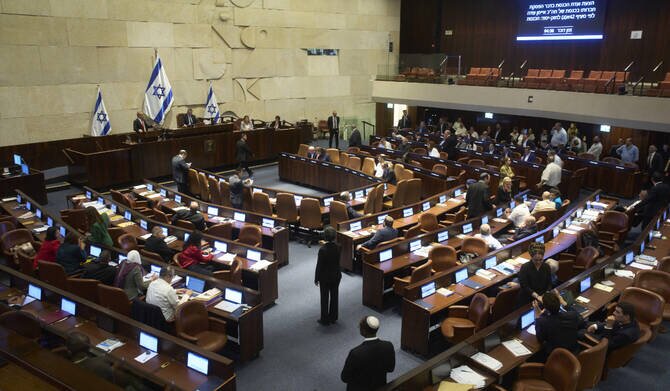
Israeli Ultra-Orthodox Party Quits Government Over Conscription Dispute
United Torah Judaism Leaves Netanyahu's Coalition Amid Long-Standing Debate on Exempting Yeshiva Students from Military Service
One of Israel's ultra-Orthodox parties, United Torah Judaism (UTJ), has announced its departure from Prime Minister Benjamin Netanyahu's ruling coalition due to a contentious issue surrounding conscription.
The dispute centers on the failure to draft a bill that would exempt yeshiva students from military service, a demand long-standing within the UTJ and other ultra-Orthodox factions.The decision by UTJ to withdraw from the government comes after six of its seven member parties resigned following a month-long stalemate.
This move has left Netanyahu with a precarious majority of 61 seats in the 120-member Knesset (parliament).
The impact on Netanyahu's ruling coalition and its stability remains uncertain, as another ultra-Orthodox party, Shas, has not yet announced if it will follow UTJ's lead.Degel Hatorah, one of the factions within UTJ, emphasized that their decision to leave the coalition was driven by repeated violations from the government regarding commitments made to safeguard the status of yeshiva students.
These students have traditionally been exempt from military service, a policy that has sparked debate and tension within Israeli politics.The Supreme Court last year ruled against the defense ministry's long-standing practice of exempting these seminary students from conscription, ordering them to be included in the mandatory military service required of most young Israelis.
Netanyahu had been actively seeking a resolution to this deadlock, which has now culminated in the current political crisis.This move by UTJ and potentially Shas could have significant implications for Israeli politics and its ongoing efforts to balance religious exemptions with national conscription policies.
The debate over conscription among ultra-Orthodox Jewish seminary students reflects broader societal tensions regarding national service and equality in a multi-faith society.
The dispute centers on the failure to draft a bill that would exempt yeshiva students from military service, a demand long-standing within the UTJ and other ultra-Orthodox factions.The decision by UTJ to withdraw from the government comes after six of its seven member parties resigned following a month-long stalemate.
This move has left Netanyahu with a precarious majority of 61 seats in the 120-member Knesset (parliament).
The impact on Netanyahu's ruling coalition and its stability remains uncertain, as another ultra-Orthodox party, Shas, has not yet announced if it will follow UTJ's lead.Degel Hatorah, one of the factions within UTJ, emphasized that their decision to leave the coalition was driven by repeated violations from the government regarding commitments made to safeguard the status of yeshiva students.
These students have traditionally been exempt from military service, a policy that has sparked debate and tension within Israeli politics.The Supreme Court last year ruled against the defense ministry's long-standing practice of exempting these seminary students from conscription, ordering them to be included in the mandatory military service required of most young Israelis.
Netanyahu had been actively seeking a resolution to this deadlock, which has now culminated in the current political crisis.This move by UTJ and potentially Shas could have significant implications for Israeli politics and its ongoing efforts to balance religious exemptions with national conscription policies.
The debate over conscription among ultra-Orthodox Jewish seminary students reflects broader societal tensions regarding national service and equality in a multi-faith society.










